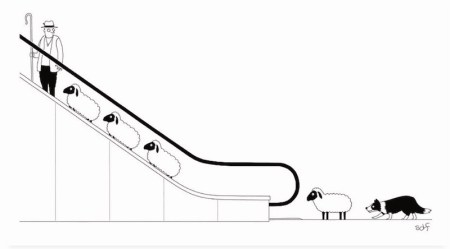The One Big Happy strip that came up in my comics feed on 12/7/18 — the Ramona St. posting mill grinds slowly, very slowly — is all about pragmatics, in particular what we take to be the point of questions we’re asked. In the strip, Ruthie asks her father what you can do to stop hiccups. Her father doesn’t inquire into why she’s asking, but assumes that she’s not merely asking an information question (she might, after all, be researching the matter for a presentation at school), and it never occurs to him that she’s asking a quiz question (to which she already knows the answer, but is checking his paternal competence at everyday medical care, should the occasion arise). Instead, he assumes that she has a personal interest in the answer to the question — this turns out to be so — indeed, that she has the hiccups and wants to know how to stop them — that’s a good guess, and it’s close, but it’s wrong — so instead of answering Ruthie’s question, by describing an appropriate remedy, he leaps to supplying the remedy himself:
(#1) A well-intentioned action misfire that follows from the various (literal) meanings of questions; practical reasoning about which ones are likely to be relevant to the situation at hand; the calculation of meanings that can be indirectly conveyed given a literal meaning — most pressingly the calculation of Ruthie’s intentions in asking this particular question, so that her father can respond to those intentions; and then his short-circuiting his reaction to all of this by dispensing with a verbal reply and going right to the action it would recommend
Why is she asking? That’s the crucial point, where it would be easy to go wrong.







